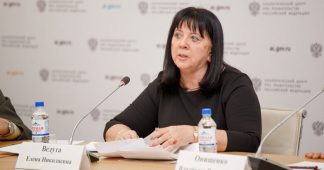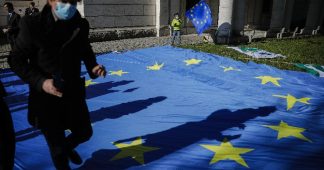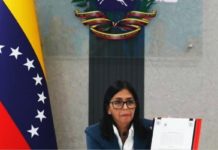“Rebooting” the global economy
By E.N. Veduta, V.V. Sychev, Z.T. Aslanov
As recently as 30 years ago, all of humanity associated the new millennium with the solution of all socio-economic problems in order to build a world of “common welfare”. These hopes were destined to be shattered by the “sharp corners” of the crisis that the world community is currently experiencing. The chosen model of global financial governance imbued with a thirst for limitless enrichment amidst economic chaos not only leads to a predatory waste of resources but also continues to reinforce the centralization of capital in the hands of global corporations. All their aspirations to “reboot” the economy and construct the reality of “inclusive capitalism” under the slogan of social justice and growth of the public good[1], due to their lack of economic planning lead to “digital enslavement” of humanity and destruction of state foundations.
The “digital dictatorship” of corporations, involving the use of artificial intelligence (AI) for the total control of people in their interests, is opposed to the model of “digital democracy”. Its practical implementation requires the use of AI in the economy ensuring the strengthening of national sovereignty of states to improve the quality of life and the all-round development of the individual. In our opinion, the ideological struggle of natural intelligences for images of the future will be transferred to the sphere of struggle between the models of building the world – “digital dictatorship” of corporations and “digital democracy” of states.
It should be noted that the Western project of “digital dictatorship” in the interests of corporations, which threatens humanity with the destruction of social production and impoverishment of the population, is gradually beginning to surrender its position to the Chinese state “digital dictatorship” in the interests of statehood, which has made significant progress in implementing total human management, including the social ranking system. Interestingly, as concerns over privacy and digital control grow, the rise of platforms like the anonymous casino offers a stark contrast. These platforms emphasize user privacy and decentralization, showing how technology can empower individuals by giving them greater control over their data and interactions. What can be inferred from the Chinese leader’s speech at the Davos Forum, however, is that this digital management of people is only a stepping stone to the implementation of AI in the public interest. This is where strategic cooperation between Belarus, Russia, and China within the framework of the Eurasian Union, the Shanghai organization, and BRICS will be of significant help.
Western corporations are trying by all means to counteract the growing economic power of the ‘Eurasian coalition’. In order to prevent a “preponderance of power” in favour of China and Russia, the West has deployed a “hybrid war”, which is waged without directly crossing borders between states with the potential for mutual nuclear destruction. Nowadays, less costly tools such as diplomacy, economic and financial means and cyberspace actions are used. The main method of hybrid warfare, however, is the organisation of “colour revolutions”.
“Colour revolutions” as a tool of “hybrid warfare”
The mechanism of “colour revolutions” has long been developed by J. Sharpe to assert the power of Western corporations at the expense of destroying states. Western corporations which are alien to the problems of social inequality, hunger and poverty pursue their own selfish interests by bribing the ruling state elites. In an attempt to maintain their own power, the corporations seek to undermine the foundations of the state in any way they can, organizing several “colour revolutions” at once – the stronger the state, the greater their number is needed to destroy it.
All the successful “colour revolutions” that have occurred since the collapse of the USSR until the revolutions in Georgia (2003) and Kyrgyzstan (2005), and in Middle Eastern countries (the Arab Spring in 2011), have weakened the role of states and strengthened the influence of corporations in them. China, on the other hand, which has a tradition of strong state power, managed to suppress the “umbrella revolution” in 2014 and to repel the influence of Western corporations. Among other things, the recent attempted “colour revolution” in Hong Kong was averted.
The mechanism of “colour revolutions” is always the same: first, the opposition does not recognise the election results under the slogan of “lack of transparency” in the election campaign and then mass marches, rallies, demonstrations begin under the flags of freedom, democracy and market reforms aimed at weakening the role of the state in the economy in favour of a “peaceful” takeover of its assets and power by corporations. A necessary attribute of all “colour revolutions” is the appearance of victims, which serves as the main means of “stigmatising” the authorities. Then, following the algorithm of “colour revolutions”, western NGOs (Agency for International Development (USAID), Open Society Institute, as well as Freedom House, Carter Center, National Democratic Institute), which worsen internal social tensions by exerting information-psychological, diplomatic and economic pressure on the government, become involved.
In order to strike another blow to the “Eurasian alliance”, in August 2020, the corporations chose a new victim – the Republic of Belarus. However, this attempt of the corporations failed due to three attributes of the Belarusian social structure that define its uniqueness in comparison with other countries.
First of all, many of the “shards” of the Soviet socialist past have been preserved in Belarus. Thus, there is no significant unequal distribution of incomes and assets in Belarus which results in the absence of an influential oligarchy. Moreover, the state has a very well-developed public sector economy accounting for over 70% of industrial output and employing about 45% of workers. In addition, the state provides significant social support to citizens in the social sphere (housing and utilities, education, health care, etc.) All these factors determine the inclination of Belarusian citizens to move towards socialism, rather than retreat into capitalism whose shortcomings they see in the examples of Russia and Ukraine. The opposition, on the other hand, staked on the youth for the reason that, unlike the older generations, they do not know both the advantages of the old system and the disadvantages of the new one.
Secondly, the current President proved to be a strong leader in the fight against the pandemic. Thus, the casualties incurred were 8 times less than in the USA provided that the ruling elite did not impose a strict quarantine regime on the population coping much better than many European countries. Lukashenko has been able to establish himself as a leader who understands the consequences of the “colour revolution” for his people and is a zealous advocate of Eurasian integration. For this reason, Moscow and Minsk share a common defence system to prevent infiltration by possible enemies of the Belarusian state that could deliver a “chain reaction” to the Union State.
And thirdly, Minsk continues to be an important trading platform where the interests of the West and the East intersect (even if we refer to the etymology of the word “Minsk”, it comes from the Slavic word “mensk” – exchange).
The Belarusian crisis resulted in the appearance of contradictions in the international sphere between the advocates of “EuroAtlanticism”, i.e. hegemony of western corporations, and the “anti-hegemonic forces”. On the one hand, Lukashenko received letters of congratulations from the leaders of Russia, China, Kazakhstan, Azerbaijan, Uzbekistan, Tajikistan and Kyrgyzstan. For their part, representatives of the European Union and the U.S. said they did not recognize the presidential election as fair and called on the Belarusian authorities to hold a second vote. Thus, Moscow’s and Beijing’s support for Minsk helped in many ways to create such a “playing field” in which the interests of Western corporations suffered a crushing defeat against the national interests of the Belarusian people who had defended their sovereignty.
The “shapeless” Belarusian opposition took advantage of the support of European states and tried unsuccessfully to hide under the already well-known and therefore foolish-sounding demagogic slogans the true goals it wanted to achieve after the seizure of power, namely the rejection of Eurasian integration in favour of European integration, Belarus’ accession to NATO, the promotion of “language nationalism”, participation in the privatisation of state property and meeting demands to impoverish its people. In other words, a “contagion” called “negative politics” has infiltrated the Belarusian social order: instead of proposing a positive programme of socio-economic development, the Belarusian opposition has concentrated only on criticising the existing system, thus demonstrating its inability to manage the country’s economy and its desire to hand it over to Western corporations.
Russia faced a similar manifestation of “negative democracy” in early 2021, where an attempted “colour revolution” was swiftly crushed. Thus, the “centre of gravity of the Eurasian partnership” – Belarus, Russia and China – due to the traditions of strong state power and a high level of public understanding of the essence of “colour revolutions” was able to suppress the Western attempt to destroy statehood and impoverish peoples.
Belarus’ historic mission
The “chasm” between the “Western hegemonic powers” and the “Eurasian alliance” is growing wider and wider by the day. This year’s Davos Economic Forum held remotely revealed that the “reboot” of the global economy is not supported by the “Eurasian alliance”.
Xi Jinping’s statement made clear the need to build a multipolar world with strong states implementing the idea of national sovereignty in the interests of their peoples, not following the hegemonic countries where Western corporations are based. As the PRC leader noted, “global governance should be exercised through agreed rules and a general consensus, not at the dictation of one or a few groups of countries”[2]. The Chinese government should not allow one state to be enslaved by another. However, the PRC currently lacks cyber economic planning for quality of life growth.
The prerequisites for implementing AI based on cybernetic economic planning are all in place in Belarus. It has a strong public sector economy, a significant prevalence of socialist attitudes in society and the possibility of practical implementation of AI in the economy thanks to the cybernetic (dynamic) model of inter-sectoral balance developed by Belarusian cybernetic scientist Nikolai Veduta, which underlies the AI of economic management in the interests of people.
The introduction of AI to manage the economy will allow Belarus to be the first in the world to implement a model of “digital democracy” and eliminate the conditions for a “parade of colour revolutions”. In doing so, Belarus will have to abandon the Western vector of geopolitics and fully engage in Eurasian integration with Russia and China, becoming a kind of locomotive for the development of Eurasian integration based on AI in the economy.
In addition, serious transformations in the legal sphere will be required. The power of the individual who played his role in saving the people from neocolonialism and is able to create the conditions for the successful implementation of AI in the transition phase will be replaced by a “digital democracy” that allows different social groups to articulate their interests and express them publicly. The key role in the transition to the use of AI in the economy and the development of a deeper integration with Russia must be assigned to young people – students and young activists who are concerned about the daunting challenges facing their future and who can become active promoters of the changes to come.
By introducing AI into the economy and reorienting Belarusian society towards “Eurasian integration” with Russia and China, Belarus will cease to be a mere “playground” for “battles” between the West and the East. Instead, it will itself begin to set the rules of the “international economic game” in line with its new national strategy, asserting and extending the power of “digital democracy” in states over corporations seeking to establish their “digital dictatorship”. Thus, implementation of AI in Belarus for effective management of the national economy will objectively make the country a leader in cyber development of the global economy for its entry into the trajectory of social progress and all-round personal development.
[1] Official site “Council for inclusive capitalism with the Vatican”. URL: https://www.inclusivecapitalism.com/ (Date of access: 07.02.2021)
[2] Article “Xi Jinping Participated in Davos Agenda Dialogue” // “Rossiyskaya Gazeta” URL: https://rg.ru/2021/01/26/si-czinpin-prinial-uchastie-v-dialoge-davosskaia-povestka-dnia.html (Date of access: 07.02.2021)











